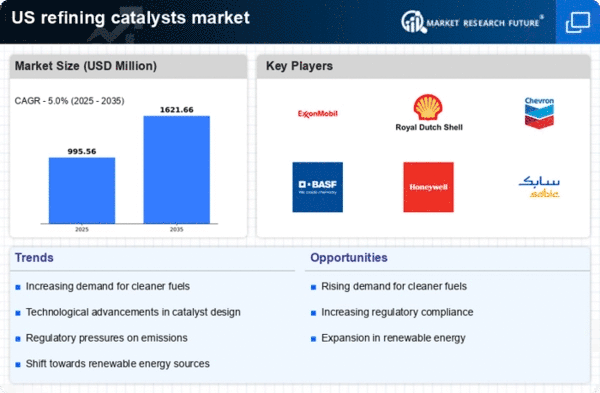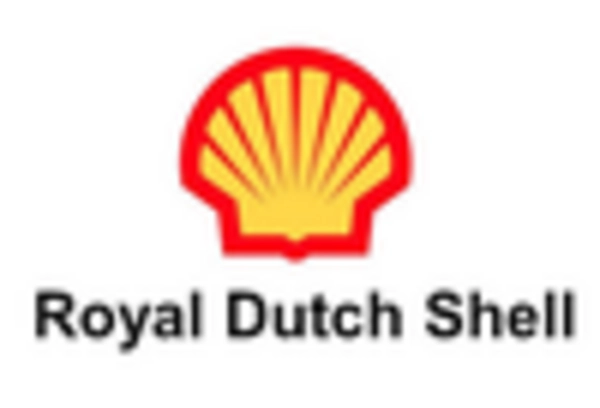The refining catalysts market is characterized by a competitive landscape that is increasingly shaped by innovation, sustainability, and strategic partnerships. Key players such as ExxonMobil (US), Chevron (US), and BASF (DE) are actively pursuing strategies that emphasize technological advancements and operational efficiencies. ExxonMobil (US) has focused on enhancing its catalyst formulations to improve yield and reduce emissions, while Chevron (US) is investing in digital transformation initiatives to optimize its refining processes. BASF (DE), on the other hand, is leveraging its extensive research capabilities to develop next-generation catalysts that align with environmental regulations, thereby positioning itself as a leader in sustainable solutions. Collectively, these strategies not only enhance their competitive positioning but also contribute to a more dynamic market environment.In terms of business tactics, companies are increasingly localizing manufacturing and optimizing supply chains to respond swiftly to market demands. The competitive structure of the refining catalysts market appears moderately fragmented, with several key players exerting considerable influence. This fragmentation allows for a diverse range of products and innovations, fostering a competitive atmosphere where companies must continuously adapt to maintain their market share.
In October ExxonMobil (US) announced a partnership with a leading technology firm to develop AI-driven solutions for catalyst performance monitoring. This strategic move is likely to enhance operational efficiencies and reduce downtime, thereby improving overall productivity. The integration of AI into refining processes could potentially revolutionize how catalysts are managed, leading to significant cost savings and improved environmental compliance.
In September Chevron (US) unveiled a new line of eco-friendly catalysts designed to minimize carbon emissions during refining processes. This initiative not only aligns with global sustainability goals but also positions Chevron (US) as a forward-thinking player in the market. The introduction of these catalysts may attract environmentally conscious clients and enhance Chevron's reputation as a leader in sustainable refining practices.
In August BASF (DE) expanded its research and development facilities in the US, focusing on the development of advanced refining catalysts. This expansion is indicative of BASF's commitment to innovation and its strategic intent to capture a larger market share. By investing in R&D, BASF (DE) is likely to accelerate the introduction of cutting-edge products that meet evolving regulatory standards and customer demands.
As of November the refining catalysts market is witnessing trends that emphasize digitalization, sustainability, and the integration of advanced technologies. Strategic alliances among key players are shaping the competitive landscape, fostering collaboration that enhances innovation and operational efficiency. Looking ahead, it appears that competitive differentiation will increasingly hinge on technological advancements and supply chain reliability, rather than solely on price. Companies that prioritize innovation and sustainability are likely to emerge as leaders in this evolving market.
















